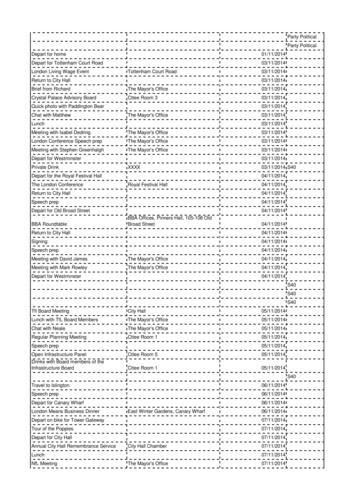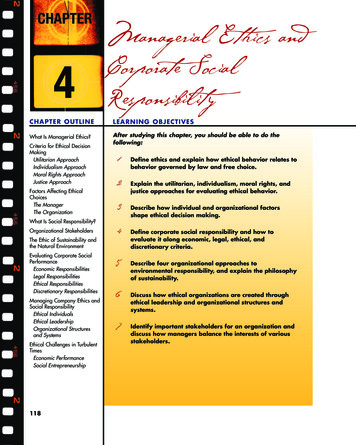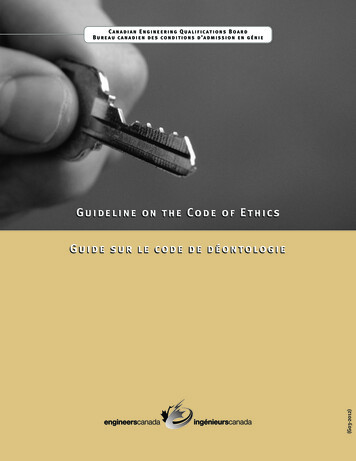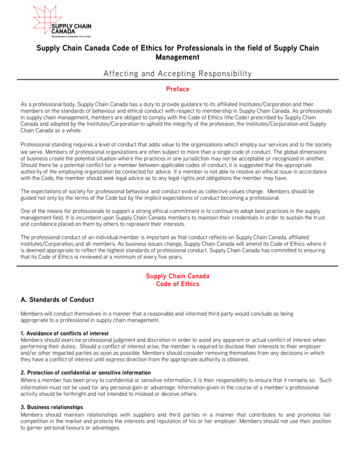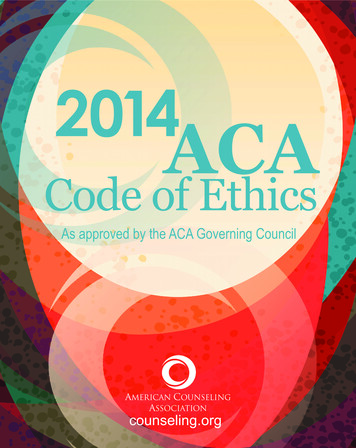
Transcription
2014ACACode of EthicsAs approved by the ACA Governing CouncilAMERICAN COUNSELINGASSOCIATIONcounseling.org
MissionThe mission of the American Counseling Associationis to enhance the quality of life in society by promotingthe development of professional counselors, advancingthe counseling profession, and using the profession andpractice of counseling to promote respect for humandignity and diversity. 2014 by the American Counseling Association.All rights reserved. Note: This document may be reproduced in its entirety without permission for non-commercialpurposes only.ContentsACA Code of Ethics PreambleACA Code of Ethics PurposeSection AThe Counseling RelationshipSection BConfidentiality and PrivacySection CProfessional Responsibility 3 3 4 6 8Section DRelationships With Other Professionals 10Section EEvaluation, Assessment, andInterpretation 11Section FSupervision, Training, and Teaching 12Section GResearch and Publication 15Section HDistance Counseling, Technology,and Social Media 17Section IResolving Ethical Issues 18Glossary of Terms 20Index 21 2
ACA Code of Ethics PreambleThe American Counseling Association (ACA) is an educational, scientific, and professional organization whose memberswork in a variety of settings and serve in multiple capacities. Counseling is a professional relationship that empowers diverseindividuals, families, and groups to accomplish mental health, wellness, education, and career goals.Professional values are an important way of living out an ethical commitment. The following are core professional valuesof the counseling profession:1. enhancing human development throughout the life span;2. honoring diversity and embracing a multicultural approach in support of the worth, dignity, potential, anduniqueness of people within their social and cultural contexts;3. promoting social justice;4. safeguarding the integrity of the counselor–client relationship; and5. practicing in a competent and ethical manner.These professional values provide a conceptual basis for the ethical principles enumerated below. These principles arethe foundation for ethical behavior and decision making. The fundamental principles of professional ethical behavior are autonomy, or fostering the right to control the direction of one’s life;nonmaleficence, or avoiding actions that cause harm;beneficence, or working for the good of the individual and society by promoting mental health and well-being;justice, or treating individuals equitably and fostering fairness and equality;fidelity, or honoring commitments and keeping promises, including fulfilling one’s responsibilities of trust inprofessional relationships; andveracity, or dealing truthfully with individuals with whom counselors come into professional contact.ACA Code of Ethics PurposeThe ACA Code of Ethics serves six main purposes:1. The Code sets forth the ethical obligations of ACA members and provides guidance intended to inform the ethicalpractice of professional counselors.2. The Code identifies ethical considerations relevant to professional counselors and counselors-in-training.3. The Code enables the association to clarify for current and prospective members, and for those served by members,the nature of the ethical responsibilities held in common by its members.4. The Code serves as an ethical guide designed to assist members in constructing a course of action that best servesthose utilizing counseling services and establishes expectations of conduct with a primary emphasis on the role ofthe professional counselor.5. The Code helps to support the mission of ACA.6. The standards contained in this Code serve as the basis for processing inquiries and ethics complaintsconcerning ACA members.The ACA Code of Ethics contains nine main sections that address the following areas:Section A: The Counseling RelationshipSection B: Confidentiality and PrivacySection C: Professional ResponsibilitySection D: Relationships With Other ProfessionalsSection E: Evaluation, Assessment, and InterpretationSection F: Supervision, Training, and TeachingSection G: Research and PublicationSection H: Distance Counseling, Technology, andSocial MediaSection I: Resolving Ethical IssuesEach section of the ACA Code of Ethics begins with anintroduction. The introduction to each section describes theethical behavior and responsibility to which counselors aspire.The introductions help set the tone for each particular section and provide a starting point that invites reflection on theethical standards contained in each part of the ACA Code ofEthics. The standards outline professional responsibilities andprovide direction for fulfilling those ethical responsibilities.When counselors are faced with ethical dilemmas thatare difficult to resolve, they are expected to engage in a carefully considered ethical decision-making process, consultingavailable resources as needed. Counselors acknowledgethat resolving ethical issues is a process; ethical reasoningincludes consideration of professional values, professionalethical principles, and ethical standards.Counselors’ actions should be consistent with the spiritas well as the letter of these ethical standards. No specificethical decision-making model is always most effective, socounselors are expected to use a credible model of decision making that can bear public scrutiny of its application. Through a chosen ethical decision-making processand evaluation of the context of the situation, counselorswork collaboratively with clients to make decisions thatpromote clients’ growth and development. A breach of thestandards and principles provided herein does not necessarily constitute legal liability or violation of the law; suchaction is established in legal and judicial proceedings.The glossary at the end of the Code provides a concisedescription of some of the terms used in the ACA Codeof Ethics. 3
ACA Code of Ethics Section AThe CounselingRelationshipIntroductionCounselors facilitate client growthand development in ways that fosterthe interest and welfare of clients andpromote formation of healthy relationships. Trust is the cornerstone of thecounseling relationship, and counselorshave the responsibility to respect andsafeguard the client’s right to privacyand confidentiality. Counselors activelyattempt to understand the diverse cultural backgrounds of the clients theyserve. Counselors also explore their owncultural identities and how these affecttheir values and beliefs about the counseling process. Additionally, counselorsare encouraged to contribute to societyby devoting a portion of their professional activities for little or no financialreturn (pro bono publico).A.1. Client WelfareA.1.a. Primary ResponsibilityThe primary responsibility of counselors is to respect the dignity and promotethe welfare of clients.A.1.b. Records andDocumentationCounselors create, safeguard, andmaintain documentation necessaryfor rendering professional services.Regardless of the medium, counselorsinclude sufficient and timely documentation to facilitate the delivery andcontinuity of services. Counselorstake reasonable steps to ensure thatdocumentation accurately reflects client progress and services provided.If amendments are made to recordsand documentation, counselors takesteps to properly note the amendmentsaccording to agency or institutionalpolicies.A.1.c. Counseling PlansCounselors and their clients workjointly in devising counseling plansthat offer reasonable promise ofsuccess and are consistent with theabilities, temperament, developmentallevel, and circumstances of clients.Counselors and clients regularly review and revise counseling plans toassess their continued viability andeffectiveness, respecting clients’ freedom of choice.A.1.d. Support NetworkInvolvementCounselors recognize that supportnetworks hold various meanings inthe lives of clients and consider enlisting the support, understanding,and involvement of others (e.g., religious/spiritual/community leaders,family members, friends) as positiveresources, when appropriate, withclient consent.A.2. Informed Consentin the CounselingRelationshipA.2.a. Informed ConsentClients have the freedom to choosewhether to enter into or remain ina counseling relationship and needadequate information about thecounseling process and the counselor.Counselors have an obligation to review in writing and verbally with clients the rights and responsibilities ofboth counselors and clients. Informedconsent is an ongoing part of thecounseling process, and counselorsappropriately document discussionsof informed consent throughout thecounseling relationship.A.2.b. Types of InformationNeededCounselors explicitly explain to clientsthe nature of all services provided.They inform clients about issues suchas, but not limited to, the following: the purposes, goals, techniques,procedures, limitations, potentialrisks, and benefits of services; thecounselor’s qualifications, credentials,relevant experience, and approach tocounseling; continuation of servicesupon the incapacitation or death ofthe counselor; the role of technology; and other pertinent information.Counselors take steps to ensure thatclients understand the implications ofdiagnosis and the intended use of testsand reports. Additionally, counselorsinform clients about fees and billingarrangements, including proceduresfor nonpayment of fees. Clients havethe right to confidentiality and to beprovided with an explanation of itslimits (including how supervisorsand/or treatment or interdisciplinaryteam professionals are involved), toobtain clear information about theirrecords, to participate in the ongoingcounseling plans, and to refuse anyservices or modality changes and tobe advised of the consequences ofsuch refusal. 4 A.2.c. Developmental andCultural SensitivityCounselors communicate informationin ways that are both developmentallyand culturally appropriate. Counselorsuse clear and understandable languagewhen discussing issues related toinformed consent. When clients havedifficulty understanding the languagethat counselors use, counselors providenecessary services (e.g., arranging fora qualified interpreter or translator)to ensure comprehension by clients.In collaboration with clients, counselors consider cultural implicationsof informed consent procedures and,where possible, counselors adjust theirpractices accordingly.A.2.d. Inability to Give ConsentWhen counseling minors, incapacitated adults, or other persons unableto give voluntary consent, counselorsseek the assent of clients to servicesand include them in decision makingas appropriate. Counselors recognizethe need to balance the ethical rightsof clients to make choices, their capacity to give consent or assent to receiveservices, and parental or familial legalrights and responsibilities to protectthese clients and make decisions ontheir behalf.A.2.e. Mandated ClientsCounselors discuss the requiredlimitations to confidentiality whenworking with clients who have beenmandated for counseling services.Counselors also explain what typeof information and with whom thatinformation is shared prior to thebeginning of counseling. The clientmay choose to refuse services. In thiscase, counselors will, to the best oftheir ability, discuss with the clientthe potential consequences of refusingcounseling services.A.3. Clients Served by OthersWhen counselors learn that their clientsare in a professional relationship withother mental health professionals, theyrequest release from clients to informthe other professionals and strive toestablish positive and collaborativeprofessional relationships.A.4. Avoiding Harm andImposing ValuesA.4.a. Avoiding HarmCounselors act to avoid harming theirclients, trainees, and research participants and to minimize or to remedyunavoidable or unanticipated harm.
ACA Code of Ethics A.4.b. Personal ValuesCounselors are aware of—and avoidimposing—their own values, attitudes,beliefs, and behaviors. Counselorsrespect the diversity of clients, trainees, and research participants andseek training in areas in which theyare at risk of imposing their valuesonto clients, especially when thecounselor ’s values are inconsistentwith the client’s goals or are discriminatory in nature.A.5. ProhibitedNoncounseling Rolesand RelationshipsA.5.a. Sexual and/orRomantic RelationshipsProhibitedSexual and/or romantic counselor–client interactions or relationships withcurrent clients, their romantic partners,or their family members are prohibited.This prohibition applies to both inperson and electronic interactions orrelationships.A.5.b. Previous Sexual and/orRomantic RelationshipsCounselors are prohibited from engaging in counseling relationships withpersons with whom they have hada previous sexual and/or romanticrelationship.A.5.c. Sexual and/or RomanticRelationships WithFormer ClientsSexual and/or romantic counselor–client interactions or relationships withformer clients, their romantic partners,or their family members are prohibitedfor a period of 5 years following the lastprofessional contact. This prohibitionapplies to both in-person and electronicinteractions or relationships. Counselors, before engaging in sexual and/orromantic interactions or relationshipswith former clients, their romanticpartners, or their family members, demonstrate forethought and document (inwritten form) whether the interaction orrelationship can be viewed as exploitivein any way and/or whether there is stillpotential to harm the former client; incases of potential exploitation and/orharm, the counselor avoids enteringinto such an interaction or relationship.A.5.d. Friends or FamilyMembersCounselors are prohibited from engagingin counseling relationships with friendsor family members with whom they havean inability to remain objective.A.5.e. Personal VirtualRelationships WithCurrent ClientsCounselors are prohibited fromengaging in a personal virtual relationship with individuals withwhom they have a current counselingrelationship (e.g., through social andother media).A.6. Managing andMaintaining Boundariesand ProfessionalRelationshipsA.6.a. Previous RelationshipsCounselors consider the risks andbenefits of accepting as clients thosewith whom they have had a previousrelationship. These potential clientsmay include individuals with whomthe counselor has had a casual, distant,or past relationship. Examples includemutual or past membership in a professional association, organization, orcommunity. When counselors acceptthese clients, they take appropriate professional precautions such as informedconsent, consultation, supervision, anddocumentation to ensure that judgmentis not impaired and no exploitationoccurs.A.6.b. Extending CounselingBoundariesCounselors consider the risks andbenefits of extending current counseling relationships beyond conventionalparameters. Examples include attending a client’s formal ceremony (e.g., awedding/commitment ceremony orgraduation), purchasing a service orproduct provided by a client (exceptingunrestricted bartering), and visiting a client’s ill family member in the hospital. Inextending these boundaries, counselorstake appropriate professional precautions such as informed consent, consultation, supervision, and documentationto ensure that judgment is not impairedand no harm occurs.A.6.c. Documenting BoundaryExtensionsIf counselors extend boundaries asdescribed in A.6.a. and A.6.b., theymust officially document, prior to theinteraction (when feasible), the rationalefor such an interaction, the potentialbenefit, and anticipated consequencesfor the client or former client and otherindividuals significantly involved withthe client or former client. When unintentional harm occurs to the clientor former client, or to an individual 5 significantly involved with the clientor former client, the counselor mustshow evidence of an attempt to remedysuch harm.A.6.d. Role Changes in theProfessional RelationshipWhen counselors change a role fromthe original or most recent contractedrelationship, they obtain informedconsent from the client and explain theclient’s right to refuse services relatedto the change. Examples of role changesinclude, but are not limited to1. changing from individual to relationship or family counseling,or vice versa;2. changing from an evaluativerole to a therapeutic role, or viceversa; and3. changing from a counselor to amediator role, or vice versa.Clients must be fully informed ofany anticipated consequences (e.g.,financial, legal, personal, therapeutic)of counselor role changes.A.6.e. NonprofessionalInteractionsor Relationships (OtherThan Sexual or RomanticInteractions orRelationships)Counselors avoid entering into nonprofessional relationships with formerclients, their romantic partners, or theirfamily members when the interaction ispotentially harmful to the client. Thisapplies to both in-person and electronicinteractions or relationships.A.7. Roles and Relationshipsat Individual, Group,Institutional, andSocietal LevelsA.7.a. AdvocacyWhen appropriate, counselors advocateat individual, group, institutional, andsocietal levels to address potential barriers and obstacles that inhibit accessand/or the growth and developmentof clients.A.7.b. Confidentiality andAdvocacyCounselors obtain client consent priorto engaging in advocacy efforts on behalf of an identifiable client to improvethe provision of services and to worktoward removal of systemic barriersor obstacles that inhibit client access,growth, and development.
ACA Code of Ethics A.8. Multiple ClientsWhen a counselor agrees to providecounseling services to two or morepersons who have a relationship, thecounselor clarifies at the outset whichperson or persons are clients and thenature of the relationships the counselorwill have with each involved person. Ifit becomes apparent that the counselormay be called upon to perform potentially conflicting roles, the counselor willclarify, adjust, or withdraw from rolesappropriately.A.9. Group WorkA.9.a. ScreeningCounselors screen prospective groupcounseling/therapy participants. Tothe extent possible, counselors selectmembers whose needs and goals arecompatible with the goals of the group,who will not impede the group process,and whose well-being will not be jeopardized by the group experience.A.9.b. Protecting ClientsIn a group setting, counselors take reasonable precautions to protect clientsfrom physical, emotional, or psychological trauma.A.10. Fees and BusinessPracticesA.10.a. Self-ReferralCounselors working in an organization(e.g., school, agency, institution) thatprovides counseling services do notrefer clients to their private practiceunless the policies of a particular organization make explicit provisions forself-referrals. In such instances, the clients must be informed of other optionsopen to them should they seek privatecounseling services.A.10.b. Unacceptable BusinessPracticesCounselors do not participate in feesplitting, nor do they give or receivecommissions, rebates, or any other formof remuneration when referring clientsfor professional services.A.10.c. Establishing FeesIn establishing fees for professionalcounseling services, counselors consider the financial status of clients andlocality. If a counselor’s usual fees create undue hardship for the client, thecounselor may adjust fees, when legallypermissible, or assist the client in locating comparable, affordable services.A.10.d. Nonpayment of FeesIf counselors intend to use collectionagencies or take legal measures to col-lect fees from clients who do not pay forservices as agreed upon, they includesuch information in their informedconsent documents and also informclients in a timely fashion of intendedactions and offer clients the opportunityto make payment.A.10.e. BarteringCounselors may barter only if the bartering does not result in exploitationor harm, if the client requests it, andif such arrangements are an acceptedpractice among professionals in thecommunity. Counselors consider thecultural implications of bartering anddiscuss relevant concerns with clientsand document such agreements in aclear written contract.A.10.f. Receiving GiftsCounselors understand the challengesof accepting gifts from clients and recognize that in some cultures, small giftsare a token of respect and gratitude.When determining whether to accepta gift from clients, counselors take intoaccount the therapeutic relationship, themonetary value of the gift, the client’smotivation for giving the gift, and thecounselor’s motivation for wanting toaccept or decline the gift.A.11. Termination andReferralA.11.a. Competence WithinTermination and ReferralIf counselors lack the competence tobe of professional assistance to clients,they avoid entering or continuingcounseling relationships. Counselorsare knowledgeable about culturally andclinically appropriate referral resourcesand suggest these alternatives. If clientsdecline the suggested referrals, counselors discontinue the relationship.A.11.b. Values WithinTermination and ReferralCounselors refrain from referring prospective and current clients based solelyon the counselor’s personally held values, attitudes, beliefs, and behaviors.Counselors respect the diversity ofclients and seek training in areas inwhich they are at risk of imposing theirvalues onto clients, especially when thecounselor’s values are inconsistent withthe client’s goals or are discriminatoryin nature.A.11.c. Appropriate TerminationCounselors terminate a counseling relationship when it becomes reasonablyapparent that the client no longer needsassistance, is not likely to benefit, or is 6 being harmed by continued counseling.Counselors may terminate counselingwhen in jeopardy of harm by the clientor by another person with whom the client has a relationship, or when clients donot pay fees as agreed upon. Counselorsprovide pretermination counseling andrecommend other service providerswhen necessary.A.11.d. Appropriate Transfer ofServicesWhen counselors transfer or refer clientsto other practitioners, they ensure thatappropriate clinical and administrative processes are completed and opencommunication is maintained with bothclients and practitioners.A.12. Abandonment andClient NeglectCounselors do not abandon or neglectclients in counseling. Counselors assist inmaking appropriate arrangements for thecontinuation of treatment, when necessary, during interruptions such as vacations, illness, and following termination.Section BConfidentialityand PrivacyIntroductionCounselors recognize that trust is a cornerstone of the counseling relationship.Counselors aspire to earn the trust of clients by creating an ongoing partnership,establishing and upholding appropriateboundaries, and maintaining confidentiality. Counselors communicatethe parameters of confidentiality in aculturally competent manner.B.1. Respecting Client RightsB.1.a. Multicultural/DiversityConsiderationsCounselors maintain awareness and sensitivity regarding cultural meanings ofconfidentiality and privacy. Counselorsrespect differing views toward disclosureof information. Counselors hold ongoing discussions with clients as to how,when, and with whom information isto be shared.B.1.b. Respect for PrivacyCounselors respect the privacy ofprospective and current clients. Counselors request private information fromclients only when it is beneficial to thecounseling process.
ACA Code of Ethics B.1.c. Respect forConfidentialityCounselors protect the confidentialinformation of prospective and currentclients. Counselors disclose informationonly with appropriate consent or withsound legal or ethical justification.B.1.d. Explanation ofLimitationsAt initiation and throughout the counseling process, counselors inform clients ofthe limitations of confidentiality and seekto identify situations in which confidentiality must be breached.B.2. ExceptionsB.2.a. Serious and ForeseeableHarm and LegalRequirementsThe general requirement that counselors keep information confidential doesnot apply when disclosure is requiredto protect clients or identified othersfrom serious and foreseeable harm orwhen legal requirements demand thatconfidential information must be revealed. Counselors consult with otherprofessionals when in doubt as to thevalidity of an exception. Additionalconsiderations apply when addressingend-of-life issues.B.2.b. Confidentiality RegardingEnd-of-Life DecisionsCounselors who provide services toterminally ill individuals who are considering hastening their own deaths havethe option to maintain confidentiality,depending on applicable laws and thespecific circumstances of the situationand after seeking consultation or supervision from appropriate professional andlegal parties.B.2.c. Contagious, LifeThreatening DiseasesWhen clients disclose that they have adisease commonly known to be bothcommunicable and life threatening,counselors may be justified in disclosing information to identifiable thirdparties, if the parties are known to beat serious and foreseeable risk of contracting the disease. Prior to making adisclosure, counselors assess the intentof clients to inform the third partiesabout their disease or to engage inany behaviors that may be harmful toan identifiable third party. Counselorsadhere to relevant state laws concerning disclosure about disease status.B.2.d. Court-Ordered DisclosureWhen ordered by a court to releaseconfidential or privileged informationwithout a client’s permission, counselors seek to obtain written, informedconsent from the client or take steps toprohibit the disclosure or have it limitedas narrowly as possible because of potential harm to the client or counselingrelationship.B.2.e. Minimal DisclosureTo the extent possible, clients areinformed before confidential information is disclosed and are involvedin the disclosure decision-makingprocess. When circumstances requirethe disclosure of confidential information, only essential informationis revealed.B.3. Information SharedWith OthersB.3.a. SubordinatesCounselors make every effort to ensurethat privacy and confidentiality ofclients are maintained by subordinates, including employees, supervisees,students, clerical assistants, andvolunteers.B.3.b. Interdisciplinary TeamsWhen services provided to the clientinvolve participation by an interdisciplinary or treatment team, the clientwill be informed of the team’s existenceand composition, information beingshared, and the purposes of sharingsuch information.B.3.c. Confidential SettingsCounselors discuss confidential information only in settings in which theycan reasonably ensure client privacy.B.3.d. Third-Party PayersCounselors disclose information tothird-party payers only when clientshave authorized such disclosure.B.3.e. Transmitting ConfidentialInformationCounselors take precautions to ensurethe confidentiality of all informationtransmitted through the use of anymedium.B.3.f. Deceased ClientsCounselors protect the confidentialityof deceased clients, consistent with legal requirements and the documentedpreferences of the client.B.4. Groups and FamiliesB.4.a. Group WorkIn group work, counselors clearlyexplain the importance and parameters of confidentiality for the specificgroup. 7 B.4.b. Couples and FamilyCounselingIn couples and family counseling, counselors clearly define who is considered“the client” and discuss expectations andlimitations of confidentiality. Counselorsseek agreement and document in writingsuch agreement among all involved partiesregarding the confidentiality of information. In the absence of an agreement to thecontrary, the couple or family is consideredto be the client.B.5. Clients Lacking Capacityto Give InformedConsentB.5.a. Responsibility to ClientsWhen counseling minor clients or adultclients who lack the capacity to givevoluntary, informed consent, counselorsprotect the confidentiality of information received—in any medium—in thecounseling relationship as specified byfederal and state laws, written policies,and applicable ethical standards.B.5.b. Responsibility to Parentsand Legal GuardiansCounselors inform parents and legalguardians about the role of counselorsand the confidential nature of the counseling relationship, consistent with current legal and custodial arrangements.Counselors are sensitive to the culturaldiversity of families and respect theinherent rights and responsibilities ofparents/guardians regarding the welfare of their children/charges accordingto law. Counselors work to establish,as appropriate, collaborative relationships with parents/guardians to bestserve clients.B.5.c. Release of ConfidentialInformationWhen counseling minor clients oradult clients who lack the capacityto give voluntary consent to releaseconfidential information, counselorsseek permission from an appropriatethird party to disclose information.In such instances, counselors informclients consistent with their level ofunderstanding and take appropriatemeasures to safeguard client confidentiality.B.6. Records andDocumentationB.6.a. Creating and MaintainingRecords and DocumentationCounselors create and maintain recordsand documentation necessary for rendering professional services.
ACA Code of Ethics B.6.b. Confidentiality of Recordsand DocumentationCounselors ensure that records anddocumentation kept in any medium aresecure and that only authorized personshave access to them.B.6.c. Permission to RecordCounselors obtain permission from clients prior to recording sessions throughelectronic or other means.B.6.d. Permission to ObserveCounselors obtain permission from clients prior to allowing any person to observe counseling sessions, review sessiontranscripts, or view recordings of sessionswith supervisors, faculty, peers, or otherswithin the training environment.B.6.e. Client AccessB.6.i. Reasonable PrecautionsCounselors take reasonable precautionsto protect client confidentiality in theevent of the counselor’s termination ofpractice, incapacity, or death and appoint a records custodian when identified as approp
3 ACA Code of Ethics Purpose The ACA Code of Ethics serves six main purposes: 1. The Code sets forth the ethical obligations of ACA members and provides guidance intended to inform the ethical practice of professional counselors. 2. The Code identifies ethical considerations relevant to professional counselors and counselors-in-training. 3. The Code enables the association to clarify .





